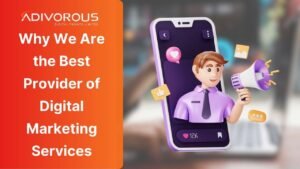The world is changing rapidly and this year we only saw a glimpse into that future. As a brand, you need to stay ahead of the competition by using the power of digital marketing. However, the future of digital marketing strategy is also changing rapidly. New technologies are changing how people interact with brands online. Today we have AI, voice search, digital assistants and AR/VR. As we look ahead, the future of digital marketing promises to be more dynamic and innovative than ever before. With rapid advancements in technology and changing consumer behaviours, businesses must stay agile and adapt to new trends to remain competitive. So, in this blog, we are going to talk about some key trends that will shape the future of digital marketing.
Artificial Intelligence and Machine Learning in Digital Marketing Strategy
Artificial Intelligence (AI) and Machine Learning (ML) are revolutionising digital marketing strategy. These technologies enable marketers to analyze vast amounts of data, predict consumer behaviour, and personalize marketing efforts. AI-powered chatbots like Gemini, Copilot, and ChatGPT, for instance, can provide instant customer support, while ML algorithms can optimize ad targeting and content recommendations. New strategies like AEO or Answer Engine Optimization are now dominating online marketing. You can learn more about AEO below.
Voice Search Optimization in Digital Marketing Strategy
With the increasing popularity of voice-activated devices like Amazon’s Alexa and Google Home, voice search has become a significant aspect of digital marketing strategy. Therefore, digital marketing agencies are optimizing their client’s content for voice search by focusing on natural language and long-tail keywords. This shift requires a new approach to SEO, in the form of AEO. This strategy emphasises conversational queries and local search optimization.
Video Content Dominance in Digital Marketing Strategy
Video content continues to dominate the digital landscape, and its importance will only grow in the future. Platforms like YouTube and Instagram Reels are driving the demand for short, engaging video content. Brands are investing in high-quality video production and leveraging live streaming to connect with their audience in real time. AI videos are also becoming mainstream with the recently released OpenAI’s Sora platform. Therefore, there will also be scepticism about the authenticity of video content. Thus, advertising agencies will focus on the quality and authenticity of videos.
Augmented Reality (AR) and Virtual Reality (VR)
AR and VR technologies are transforming the way consumers interact with brands. These immersive experiences allow customers to visualize products in their environment before making a purchase. For example, furniture retailers can use AR to let customers see how a piece of furniture would look in their home. As these technologies become more accessible, they will play a crucial role in enhancing customer experiences. Creating immersing advertising for VR or AR platforms is becoming a priority in digital marketing strategy.
Data Privacy and Security in Digital Marketing Strategy
As data breaches and privacy concerns continue to make headlines, consumers are becoming more cautious about sharing their personal information. Digital marketers will need to prioritize data privacy and security, ensuring compliance with regulations like GDPR and CCPA. Building trust with customers through transparent data practices will be essential for long-term success.
Personalization and Customer Experience
Personalization will remain a key driver of digital marketing success. Consumers expect tailored experiences that cater to their individual preferences and needs. By leveraging data and AI, marketers can deliver personalized content, product recommendations, and targeted ads. Enhancing the overall customer experience will be critical in building brand loyalty and driving conversions. Crafting ads that resonate with the masses will be the key to success and the reason for your brand’s growth.

Social Commerce-Focused Strategies
Social media platforms are evolving into powerful e-commerce channels. Features like Instagram Shopping and Facebook Marketplace allow users to discover and purchase products directly within the app. This trend, known as social commerce, will continue to grow, providing brands with new opportunities to reach and engage with their audience. Therefore, e-commerce will find more ways to be more profitable and digital marketing agencies will create marketing material that will entice people to buy your product.
Sustainability and Ethical Digital Marketing Strategy
Consumers are increasingly concerned about sustainability and ethical practices. Brands that prioritize environmental responsibility and social impact will resonate with conscious consumers. Digital marketing strategies will need to reflect these values, promoting sustainable products and transparent business practices.
Conclusion
The future of digital marketing is exciting and full of possibilities. By embracing emerging technologies, prioritizing data privacy, and focusing on personalization and customer experience, businesses can stay ahead of the curve. As the digital landscape continues to evolve, staying informed and adaptable will be key to achieving long-term success in digital marketing. Adivorous is also taking steps to implement an industry-leading digital marketing strategy and help local businesses find footing not only on a national level but also on the worldwide stage! Check out our latest blog on the Importance of Technical SEO in Digital Marketing.
FAQs
- How will AI and Machine Learning impact digital marketing?
- AI and Machine Learning will revolutionize digital marketing by enabling marketers to analyze vast amounts of data, predict consumer behaviour, and personalize marketing efforts. AI-powered chatbots and ML algorithms will optimize ad targeting and content recommendations.
- Why is voice search optimization important for the future of digital marketing?
- With the increasing popularity of voice-activated devices, optimizing content for voice search is crucial. This involves focusing on natural language and long-tail keywords, which requires a new approach to SEO, emphasizing conversational queries and local search optimization.
- What role will video content play in digital marketing?
- Video content will continue to dominate the digital landscape, with platforms like YouTube and Instagram Reels driving demand for short, engaging videos. Brands will need to invest in high-quality video production and leverage live streaming to connect with their audience in real time.
- How will AR and VR technologies transform consumer interactions with brands?
- AR and VR technologies will provide immersive experiences, allowing customers to visualize products in their environment before making a purchase. These technologies will enhance customer experiences and play a crucial role in digital marketing strategies.
- Why is data privacy and security important in digital marketing?
- As data breaches and privacy concerns increase, consumers are becoming more cautious about sharing personal information. Digital marketers must prioritize data privacy and security, ensuring compliance with regulations like GDPR and CCPA to build trust with customers and achieve long-term success.






